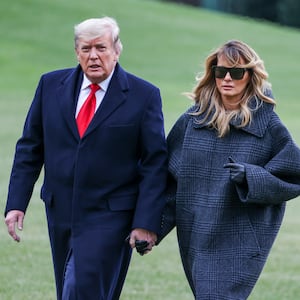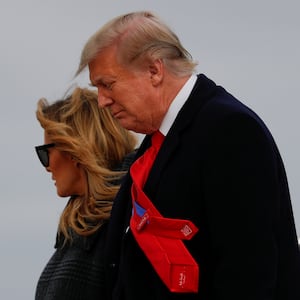Georgia Secretary of State Brad Raffensperger has forever tied his legacy to former President Donald Trump, writing in a new book out next month that the now infamous call from Trump to “find 11,780 votes” to overturn the 2020 election was a “threat” from a “bully” that “was nothing but an attempt at manipulation.”
“For the office of the secretary of state to ‘recalculate’ would mean we would somehow have to fudge the numbers,” Raffensperger writes in his yet-to-be-released book that The Daily Beast obtained before its publication. “The president was asking me to do something that I knew was wrong, and I was not going to do that.”
It’s the sharpest rebuke yet from a mild-mannered Republican state official who has now repeatedly pushed back on Trump’s unrelenting, 11-month campaign to cast doubt on his bitter election loss in Georgia and tarnish Raffensperger’s reputation.
The book not only sheds new details on what was going through the secretary of state’s head during the call, it also makes it clear that Raffensperger thought the call was peppered with threats from “a president who felt that bullying the secretary of state of Georgia was his only means to change the outcome.” And while the president’s allies have defended Trump’s call as perfectly legal and unthreatening, Raffensperger says in his book that he interpreted Trump’s words as a command.
“Now he was directly attacking the election itself. He was asking me, as Georgia’s secretary of state, to ‘find 11,780 votes’—enough for him to claim a win in our state,” Raffensperger writes.
His mindset is pivotal, as lawyers have already hypothesized that Raffensperger could one day be called as a witness in a potential criminal trial against Trump for his blatant attempts to influence a public official.
Anyone who “solicits, requests, commands” or otherwise directs someone to commit election fraud can be charged with a state felony, according to Georgia’s criminal code. Meanwhile, threats and interference are key elements to several federal criminal charges related to election meddling.
As Raffensperger recounts in his book, the unlikely battle between a conservative state elections official and Trump started late last year.
From the moment Georgia poll workers tallied mail-in votes to put Biden in the lead, Trump has excoriated Georgia elections officials whom he blamed for standing by election results: Governor Brian Kemp and the secretary of state, Raffensperger. Trump’s campaign against these two Republicans reached a fever pitch during a Thanksgiving 2020 press conference when the president called Raffensperger “an enemy of the people,” sparking a barrage of death threats on Raffensperger’s family—including a home break-in.
Until now, Raffensperger has mostly maintained a reserved demeanor, leaving the task of a vigorous defense to his sharp-tongued chief operating officer, Gabriel Sterling. But in his book, Integrity Counts—set for release on Nov. 2—Raffensperger describes what led to the infamous Jan. 2 call.
It was a Saturday morning and Trump was, unsurprisingly, watching Fox News when he saw Raffensperger discussing Georgia’s elections process and Biden’s victory at the polls.
“We did an audit of the race,” Raffensperger said on Cavuto Live. “President Trump still lost. Then we did a full recount. President Trump still lost.”

That declaration seems to have caught the president’s attention. The book recalls how Trump immediately sought to speak with Raffensperger and had his chief of staff, Mark Meadows, reach out to Raffensperger’s deputy, Jordan Fuchs.
Fuchs alerted Raffensperger as he drove back from the remote TV studio in northeast Atlanta that the president wanted to speak with him. He took the call from the president that afternoon at his kitchen counter. On one end of the call was the secretary of state, his deputy, and the department’s top lawyer. On the other was the president, his chief of staff, and several of his lawyers.
In a chapter titled, “The Call,” Raffensperger lays out a transcript of the conversation, sprinkling in his thoughts throughout the conversation. For example, when Trump said Raffensperger’s assertions that the elections were legitimate were “very dangerous,” the state official took it as intimidation.
“I felt then—and still believe today—that this was a threat,” he recalls.
He also makes it clear how he interpreted it when Trump warned the state official and the agency’s lawyer, Ryan Germany, that standing firm with the election results was “a big risk to you” and “a criminal offense.”
“Now President Trump is using what he believes is the power of his position to threaten Ryan and me with prosecution if we don’t do what he tells us to do. It was nothing but an attempt at manipulation,” Raffensperger writes.
When Trump said conspiracists “are going around playing you and laughing at you behind your back, Brad,” the state official saw right through it.
“President Trump is now turning to ridicule, perhaps thinking a shot at my ego will persuade me to do something that I knew wasn’t right and had no power to do,” he writes.
Raffensperger also describes why, after Trump’s long-winded, conspiracy-laden diatribe, his very first response was to say, “We don’t agree that you have won.” He was already thinking about how this would all play out in court.
“I needed to say, from the outset, that I disagreed with him. I could not give his lawyer the opportunity in a deposition or in court to say to me, ‘You never disputed what he said.’ I had to be very clear and precise that the facts did not support his statements,” he writes.
The book also claims that Trump attorney Cleta Mitchell, a star in the conservative legal community who was also on the call, “was asking for certain personal information on voters.”
Raffesnberger makes it clear that his office rebuffed those advances as well. It seems Raffensperger was already well aware of how Team Trump had been using its power to expose the names of low-ranking poll workers across the country and unfairly accusing them of illegal behavior, sparking threats against them as well.
Representatives for the former president did not immediately return a request for comment. However, Trump published an open letter to Raffensperger just two weeks ago, demanding that his office “start the process of decertifying the Election… and announce the true winner.” The letter also rips into Raffensperger, accusing him of doing a tremendous disservice to the Great State of Georgia, and to our Nation.”
At the moment, the Fulton County District Attorney is proceeding with a criminal investigation into the call. Last month, The Daily Beast revealed that local investigators have already interviewed the secretary of state and his staff.
District Attorney Fani Willis previously revealed to The Daily Beast that she has spun up a new anti-corruption team to explore what state laws, if any, were broken. And sources say prosecutors are eyeing ‘false statement’ charges against Rudy Giuliani and others on Team Trump who lied to state legislators in their campaign to sow doubt over election results.
—With additional reporting from Justin Baragona.









